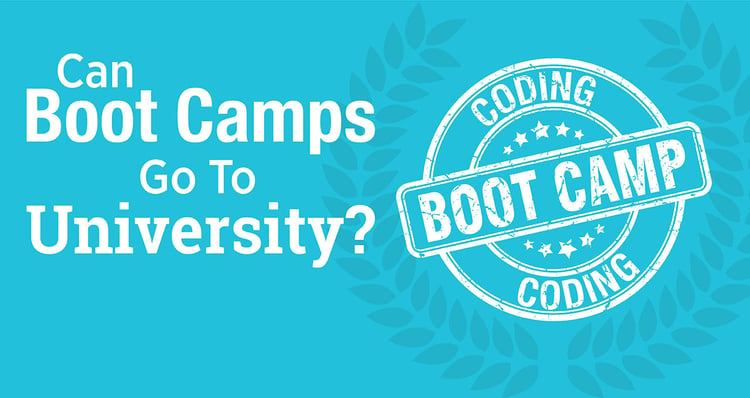
Thinking about tech boot camps as a new revenue stream? We are.
If you've not already read last weeks post about Full On Armchair Recruiting with clear and supported guidance on what comes next for student enrollment, student experience and student services, well, we highly recommend it ; -) We've received a fair number of emails from your peers who found the advice highly valuable as they make plans for fall 2020 and beyond.
Here's the thing: given anticipated and imminent enrollment drops, new revenue sources are going to be really important.
With all the changes happening now and coming down the pike for academia, we want to continue to look forward and point the way for how your institution demonstrates its value and hopefully finds new revenue sources. Turns out, in this environment, thinking about new revenue streams has suddenly taken on a fevered pitch. That's a good thing. We LOVE innovation.
You and your colleagues have likely talked about the quick-hit education providers cropping up in the form of coding boot camps. We’ve been keeping an eye on these burgeoning businesses ourselves. After all, they’ve been sprouting like weeds over the past eight or so years.
Their aim is to teach practical skills to nontraditional students looking to enter or change careers or move up the professional ladder. Courses tend to use project-based learning to cover topics like full-stack web development, digital marketing, data analytics, UX/UI design, cybersecurity, cryptocurrency, blockchain and more.
Universities have seen this as a threat to their engineering and IT offerings. But are they truly threats?
Within the past few months, Michigan State University, George Washington University and the University of Toronto School of Continuing Studies each announced their own tech boot camp (or fintech) programs. There are others taking this direct competitive approach.
The trick for many universities is that their infrastructure is not necessarily set up to provide continuous, short-run programs. One challenge for boot camps is that their administrative infrastructure is slim and stuggles to support scaled growth. They also struggle with credibility. Will their certificates have value for the graduates over time?
Can you see where we’re going with this?
There’s an opportunity for a symbiotic relationship that can benefit students, local economies and your respective programs. Enrollment marketing, take note! Read on.
To provide some perspective on the demand for this new wave of learning, the industry resource Course Report listed 30 boot camp-style programs in its 2013 directory. There are now over 500 on that same list. On average, a boot camp costs about $13,500 and runs anywhere from six to 26 weeks. In 2018, the industry graduated 23,000 students and grossed $309 million. Clearly, there’s a trend here.
Will Work for Office Space
Boot camps are nimble and zeroed in on a narrow goal. Their packages typically include marketing, enrollment, curriculum, instruction, career services and operations. They are affordable and faster when compared to a four-year computer science degree, which prospective students find attractive. In fact, the average boot camp enrollee is 30 years old with six years’ work experience, a bachelor’s degree and has never worked as a programmer, based on research done by FullStack Academy. They want a school that will teach specific, practical skills that meet near-term needs and address local employers’ specific skills gaps. These programs provide the kind of quick-turn model larger institutions don’t tend to offer.
On the flip side, tech boot camps don’t have the benefit of an established, trusted brand of higher learning. Your university name could bring prestige to these turnkey programs, drive enrollment and boost students’ resumes. Importantly, they can tap into your existing marketing and admissions infrastructure, and frankly they can benefit from classroom space you may be able to provide.
The partnership between your university and a boot camp isn’t quite plug-and-play. There are administrative and revenue share options to sort out. No small matters.
Finding The Best Fit
If this type of partnership piques your interest, there are a few ways to quickly explore the industry. CourseReport.com and SwitchUp.org are two groups that give boot camp rankings and reviews. Their apples-to-apples comparisons can help you determine which business have been around the longest, which have produced the most and “best” alumni and so on. The Council on Integrity in Results Reporting at cirr.org is another helpful resource. And, when the time comes to dive a little deeper, we can help you think through the process, too.
Our Non-Traditional Student Recruitment eBook can offer insights into the opportunities and challenges when going after students interested in these kinds of tech programs (as described above). The eBook also points to the value of building the kinds of partnerships we are recommending here. Intead Plus members can download the extended version of the eBook with marketing plans, student personas and much more.
Big picture strategic partnerships between the attractive offerings tech boot camps can provide and the name and infrastructure power your institution can offer are a great combination. Now for the hard work of getting your internal academic community to play nice and welcome them to the table. Your work is cut out for you.


